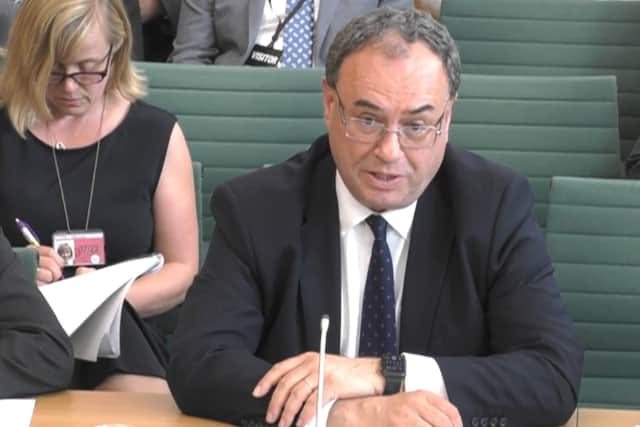‘Apocalyptic’ food shortages: Bank of England governor Andrew Bailey issues stark warning about Ukraine war
and live on Freeview channel 276
The governor of the Bank of England has warned of “apocalyptic” food prices, but stood by the Bank’s policy decisions.
Andrew Bailey hit back at criticism that the Bank acted too slowly to tackle inflation, saying he felt “helpless” amid soaring costs.


What did he say about food prices?
Advertisement
Hide AdAdvertisement
Hide AdMr Bailey told MPs at the Treasury Select Committee on Monday (16 May) that there is “very real income shock” coming from energy prices and “apocalyptic” food prices, and blamed the “bad situation” on a series of external factors, including the war in Ukraine and the lockdown in China.
He said that consumer demand will be impacted by current inflation, which is the highest in 30 years, and this is expected to cause higher unemployment.
In March, the Office for National Statistics (ONS) recorded inflation at 7% and later this week is expected to unveil more than 8% inflation for last month.
The Bank warned that inflation is likely to peak at 10.25% during the final quarter of this year.
Advertisement
Hide AdAdvertisement
Hide AdMr Bailey told MPs: “The main driver of inflation and what brings it down is the very big, real income shock which is coming from outside forces and, particularly, energy prices and global goods prices.
“That will have an impact on domestic demand and it will dampen activity, and I’m afraid it looks like it will increase unemployment.”
The governor said “we are walking a very narrow path” between surging inflation and risks to growth, and stressed that the war in Ukraine has led to an unpredictable jump in inflation, warning there is still a “major worry” over further rises in food costs due to the conflict.
“The Ukrainian finance minister said that there is food in store but they can’t get it out,” he told MPs.
Advertisement
Hide AdAdvertisement
Hide Ad“While he was optimistic about crop planting, as a major supplier of wheat and cooking oil, he said we have no way of shipping it out and that is getting worse.
“It is a major worry for this country and a major worry for the developing world. Sorry for being apocalyptic but that is a major concern.”
How much has food inflation increased?
In March, UK food inflation increased by 5.9% and it is expected to accelerate in the coming months.
Michael Saunders, who sits on the Bank’s monetary policy committee, said he believes tighter monetary policy would have done little to alter the current rate of inflation.
Advertisement
Hide AdAdvertisement
Hide AdMr Bailey also told MPs that he does not think the Bank “could have done anything differently” to avoid sharp price rises.
He said: “There have been a series of supply shocks, most recently with the impact of the war – Russia’s invasion of Ukraine.
“We can’t predict things like wars – that’s not in anybody’s power.”
The government also repeated his recent assertion that workers, particularly high earners, should “think and reflect” before asking for wage increases in order to avoid fuelling wider inflation further.
Advertisement
Hide AdAdvertisement
Hide AdThe Bank boss, who was paid £575,000 in the latest financial year, said: “I spoke in an interview about this. I do think people, particularly people who are on higher earnings, should think and reflect on asking for high wage increases.
“It’s a societal question, but I am not preaching about this. I was asked if I have taken a pay rise myself this year and I said no, I had asked the Bank not to give me one, because I felt that was the right thing for me personally.
“But everybody must make their own judgement on that.”
Comment Guidelines
National World encourages reader discussion on our stories. User feedback, insights and back-and-forth exchanges add a rich layer of context to reporting. Please review our Community Guidelines before commenting.
